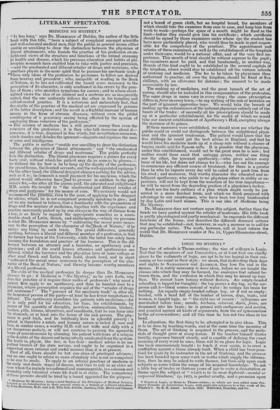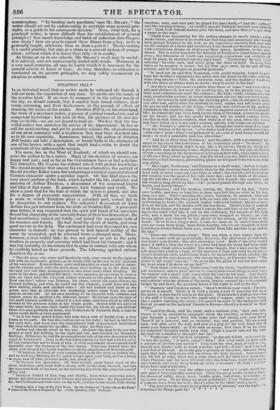LOGIC NO MYSTERY.* •
THE vice of schools is Theme-writing ; the vice of colleges is Logic. Not that the members of our Universities, or at least that one chiefly giVen to the rudiments of logic, are apt to be too logical in their rea- soning,- or too exact in their style : we mean, that in devoting their days and nights to SANDERSON and ALDRICH, they lose the end in the means. It is surely necessary to have ideas, before we are taught the classes into which they may be formed, the analogies that subsist be- tween them, and the confusion in which they may be mixed up toge ther. We cannot learn botany without flowers. An empty-headed schoolboy is tapped for thoughts : the tap proves a dry tap, as the sur- geons call it—blood comes instead of water: he wrings his brain for nothing. An equally empty-headed college boy, or if not so empty- headed, with a head full of the lumber of horses, dogs, boats, and women, is taught logic, or "the right use of reason :" syllogisms are marshalled before him ; moods, barbara, celarent, darii, ferio, are drummed into his brain ; he is primed with enthynzenze and sorties, and guarded against all kinds of argumenta, from the ad ignorantiarn to the ad verecundiam ; and all this time he has not two ideas in his head.
In education, the first thing to be attempted is to give ideas. This is to be done by teaching words, and at the same time the meaning of them. The art of thinking is acquired in the process, and the mate- rials of thought grow at every lesson. If the teacher himself thinks lucidly, expresses himself clearly, and is capable of defining the exact meaning of every word he uses, there will be no place for logic. Logic has been unconsciously taught : to teach it over again, is to erect a scaffolding against a house already built. When a child has been prac- tised for years by its instructor in the art of thinking, and the process has been founded upon some work or works which supply the informa- tion, then he may be asked to write themes, but then only upon such subjects as come within the range of his acquired knowledge. To ask a little boy of twelve or thirteen years of age to write a dissertation or theme upon the subject of "which is to be most deplored—mental or corporeal blindness;' (p. 102), is perfect cruelty, and a premium upon * Practical Logic, or Hints to Theme-writers; to which are now added some Pre- fatory Remarks on Aristotelian Logic, with particular reference to a late work of Dr. Whately's. By B. H. Smart. London, 1829. Whittaker, Treacher, and Co. commonplace. "In treating such questions;' says Mr. SMART, "the writer should set out by endeavouring to ascertain some general prin- ciples, as a guide to his subsequent (recision." Now, what task, for a practised writer, is more difficult than the establishment of general principles ? how much knowledge and habit of reflection does the pro- cess imply? how are you to expect these things from a boy, as he is generally taught, otherwis'e than as from a parrot ? Theme-writing is a useful practice, but only as a chain in a general system of compo- sition; without which it is worse than folly—it is cruelty. As things go on in our schools, Mr. SMARTS work may be useful : it is rational, and not unnecessarily loaded with words. Moreover, in a very small compass, all may be learnt which it is necessary for the general scholar to know of logic. As long, therefore, as education is conducted on its present principles, we may safely recommend ifs adoption in schools.



















 Previous page
Previous page